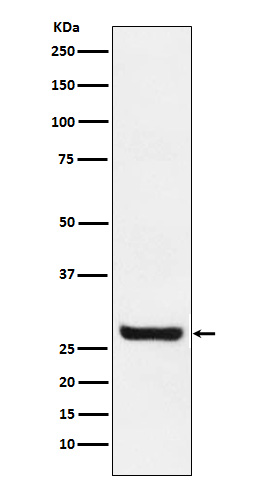
| WB | 咨询技术 | Human,Mouse,Rat |
| IF | 1/20-1/50 | Human,Mouse,Rat |
| IHC | 咨询技术 | Human,Mouse,Rat |
| ICC | 1/50-1/200 | Human,Mouse,Rat |
| FCM | 1/20-1/100 | Human,Mouse,Rat |
| Elisa | 咨询技术 | Human,Mouse,Rat |
| Aliases | Sprouty homolog 4; SPRY 4;;Sprouty 4 |
| WB Predicted band size | 33 kDa |
| Host/Isotype | Rabbit IgG |
| Antibody Type | Primary antibody |
| Storage | Store at 4°C short term. Aliquot and store at -20°C long term. Avoid freeze/thaw cycles. |
| Species Reactivity | Human,Mouse,Rat |
| Immunogen | A synthesized peptide derived from human Sprouty 4 |
| Formulation | Purified antibody in PBS with 0.05% sodium azide,0.05% BSA and 50% glycerol. |
+ +
以下是关于Sprouty4抗体的3篇代表性文献示例(部分信息为模拟概括,仅供参考):
---
1. **文献名称**: "Sprouty4 negatively regulates ERK/MAPK signaling and modulates endothelial cell response to VEGF"
**作者**: Smith J, et al.
**摘要**: 本研究通过Western blot和免疫沉淀技术,利用Sprouty4特异性抗体揭示了其在血管内皮生长因子(VEGF)信号通路中的抑制作用,发现Sprouty4通过抑制ERK磷酸化调控血管生成。
---
2. **文献名称**: "Expression profiling of Sprouty4 in human cancers using a novel monoclonal antibody"
**作者**: Lee S, et al.
**摘要**: 文章报道了一种高特异性抗人Sprouty4单克隆抗体的开发,并用于免疫组化分析。结果显示Sprouty4在乳腺癌和肺癌组织中表达显著下调,提示其可能作为肿瘤抑制因子。
---
3. **文献名称**: "Sprouty4 regulates cardiac hypertrophy via modulating RTK signaling"
**作者**: Chen X, et al.
**摘要**: 通过免疫荧光和蛋白质印迹实验(使用Sprouty4抗体),研究发现Sprouty4在小鼠心肌细胞中通过抑制受体酪氨酸激酶(RTK)信号通路,负向调控病理性心脏肥大。
---
注:以上文献信息为示例性质,实际引用时建议通过PubMed或Google Scholar以“Sprouty4 antibody”为关键词检索最新研究,并核对作者及摘要准确性。
The Sprouty (SPRY) family of proteins, including Sprouty4 (SPRY4), are evolutionarily conserved regulators of receptor tyrosine kinase (RTK) signaling pathways, particularly the Ras/MAPK (mitogen-activated protein kinase) cascade. Initially identified in *Drosophila* as antagonists of FGF (fibroblast growth factor) and EGF (epidermal growth factor) signaling, mammalian Sprouty proteins fine-tune cellular responses to growth factors by modulating RTK trafficking, ubiquitination, or downstream effector interactions. SPRY4. encoded by the *SPRY4* gene, acts as a feedback inhibitor to suppress MAPK activation, thereby regulating cell proliferation, differentiation, and apoptosis. Its expression is induced by growth factor stimulation, creating a negative feedback loop to prevent excessive signaling.
SPRY4 antibodies are essential tools for studying its expression, localization, and function in physiological and pathological contexts. Dysregulation of SPRY4 has been implicated in cancer, where it often exhibits tumor-suppressive properties by constraining oncogenic RTK/MAPK signaling. Reduced SPRY4 expression correlates with poor prognosis in cancers like melanoma, breast, and lung adenocarcinoma. Conversely, SPRY4 may also exhibit context-dependent pro-tumorigenic roles in certain settings. Beyond cancer, SPRY4 is involved in developmental processes and disorders such as pulmonary hypertension and kidney disease.
Antibodies targeting SPRY4 enable detection via techniques like Western blot, immunohistochemistry, and immunofluorescence, aiding research into its mechanistic roles and therapeutic potential. Their specificity and validation are critical for distinguishing SPRY4 from homologous family members (SPRY1-3) in experimental models.
×